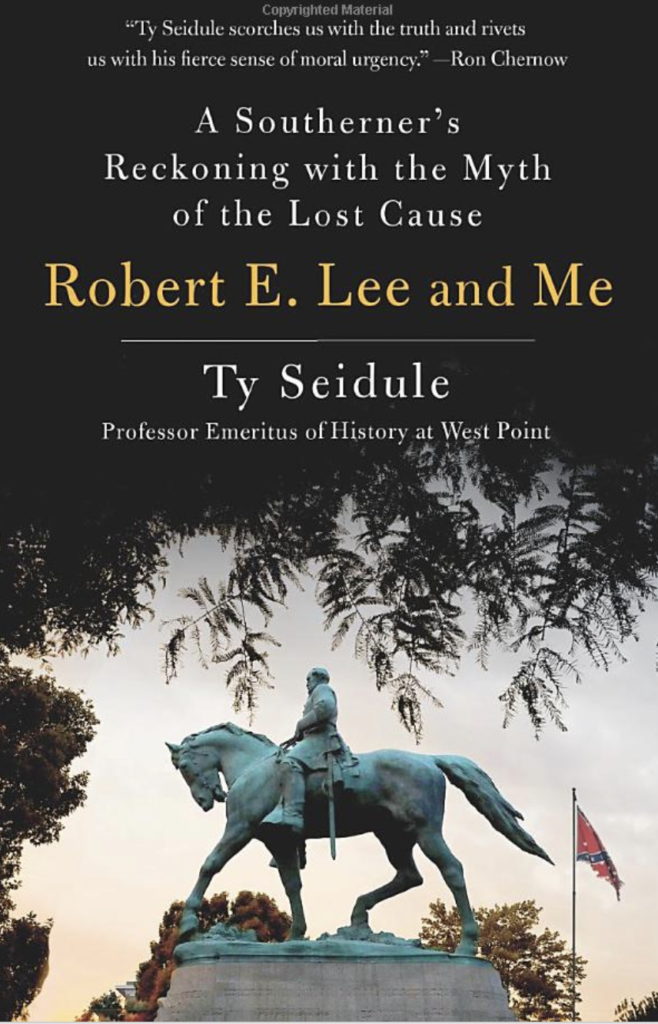A mini review (and reflection upon) Robert E. Lee & Me: A Southerner’s Reckoning with the Myth of the Lost Cause, by Ty Seidule.
How pervasive is the narrative of the Lost Cause? And how true is it? Robert E. Lee & Me tells the story of one man’s coming to grips with history. Seidule, professor emeritus of history at West Point and once a good Southern boy who idolized Robert E. Lee, reflects on his awakening to the pervasive lost cause narrative. He points out that his former hero, Lee, broke his oath before God to the United States in order to fight for an enemy nation. And, despite the prevalent Southern narrative that the Civil War was fought for states’ rights, he quotes directly from MANY leaders of the Confederacy to prove that the main right being fought for was the “right” to protect and expand the “peculiar institution” of slavery. Robert E. Lee himself benefited from the labor and mistreatment of slaves for many years, only eventually freeing them because of the terms of a will under which he had temporarily inherited human beings.
Thoughts on Robert E. Lee & Me
I’m a Southerner who was homeschooled by a Northern mother, so I’ve always grown up with a strange view of the Civil War. As a child, I knew to despise slavery and reject the causes of the Confederacy. But I was also raised to look up to the Christian generals of the Confederacy such as Robert E. Lee, and I remember reading biographies that attempted to reconcile his Christian ideals with his protection of the abhorrent practice of slavery. My friends and neighbors attempted to convince me that the war wasn’t actually fought over slavery. So this book was an eye-opening read for me. Fellow history nerds will enjoy Robert E. Lee & Me. And if, like me, you’ve heard pieces of the lost cause story promoted by your friends and family for years, you may find cause for grief.
Does even this mini review of Robert E. Lee & Me make you upset? I encourage you to read what the leaders of the Confederacy themselves had to say about their reasons for secession. Seidule gives a sweeping overview of the history of the sites where he has lived since childhood in various Southern cities. But he could not cover each hometown Confederate soldier. So take a look for yourself.
Yes, I, too, have at least one ancestor on my Southern side of the family who fought for the Confederacy. Truthfully, defense of slavery was unlikely to have been a primary motivation for that poor Arkansan from a poverty-stricken county. But the roots of secession were not pure, and this book exposes those roots. And Robert E. Lee? Was he a traitor and hypocrite or an honorable gentleman? Perhaps he was a little of both. Any human idol will topple, and Lee is no exception.
A quote from Seidule the Army vet:
“During the bloodiest war in American history, Lee and his comrades killed more U.S. Army soldiers than any other enemy, ever. And they did it for the worst reason possible: to create a nation dedicated to exploit enslaved men, women, and children, forever.”
Ty Seidule
I recently published my list of favorite books of 2022, and I know this will make my list of favorites for this year. Happy New Year, all!



 : a favorite place to walk when we can!
Once
: a favorite place to walk when we can!
Once 
![The first photos are of my parents’ sprawling rural Arkansas garden. The last is of my tiny little beds in the big city. Plants bring life to even the smallest corner!
I’ve been reading some beautiful fiction this year, and I just posted a review of a book by one of my favorite authors, Leif Enger. (https://therestfulhome.com/brave-young-handsome-review/ in your browser, or click on the link in my Instagram profile) If you don’t have time to read the book, though, here’s just a quote or two for your enjoyment:
🎼
“Death arrived easy as the train; [he] just climbed aboard, like the capable traveler he was.”
🛤️
On riding a horse: “You are a feeble and tenuous being; the only thing a horse wants from you is your absence.” 🐎 😄
#quotes #leifenger #amreading #gardens #gardening](https://scontent-atl3-1.cdninstagram.com/v/t39.30808-6/468657020_18342474787176025_4442629541396867851_n.jpg?_nc_cat=108&ccb=1-7&_nc_sid=18de74&_nc_ohc=DEja6UP2ct4Q7kNvgEYJxCM&_nc_zt=23&_nc_ht=scontent-atl3-1.cdninstagram.com&edm=ANo9K5cEAAAA&_nc_gid=AA4bBsvQ_JpqZXLUPUTpTC8&oh=00_AYCjI9LUx-cJxe6cu0n7H1Gounaz92aBlTrQacnKut8umg&oe=67567CAB)
















